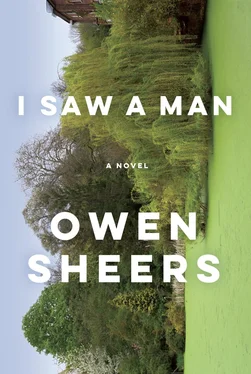“I suppose that’s why I chose Parsons,” she said, uncurling her legs but still holding the cushion across her stomach. “I mean, I could have gone anywhere closer to home. Central Saint Martins, Kensington and Chelsea. Not Oxbridge, I suppose. I don’t think they do photography, do they? Anyway, that’s not the point. I was determined. New York or bust.” She shook her head. “God, my poor parents. I must have been a right pain in the arse.”
Her teenage desire had been fuelled not just by her own glimpses of Manhattan but also those of others. The work of Nan Goldin, Robert Frank, Garry Winogrand. Through the lenses and frames of these photographers, New York became a kaleidoscope of event for her, a maelstrom of the human and the built. All through her first year at Parsons she’d worked diligently to follow their example, spending whole days immersed in the chemical scent of the darkroom. But then one day towards the end of the summer semester, stepping back from her pegged prints bathed in the red bulb, Samantha had seen that she had nothing new to say, or to see. She was twenty years old and beyond the bar or the bedroom it was her first discovery of her adult self.
“Lucky, in a way,” she said, undoing her hair. Running a hand through it, her fingers worked to untangle a knot, as if arranging threads on a loom. “I mean, some people spend their entire lives not learning that. Imagine, all those years producing crap, without knowing it.”
“Those photos in the hall,” Michael said. “You took those, didn’t you?”
She looked at him as if he was trying to catch her out. “Yes.”
“They’re not crap,” he said. “They’re good.”
She nodded slowly, allowing him his point. “They’re not bad. But that’s what I mean. I wouldn’t have taken them if I hadn’t first realised everything else I was doing was so derivative. I mean, it really was, honestly. Terrible stuff. I suppose those are all right. But that’s why they’re on the wall. Because they’re the only ones that were.”
―
In her final year, Samantha had to submit two end-of-course projects. The first of these she titled The Choice. For three weeks she sat in a Midtown deli between Lexington and Third. Arriving early, she’d position herself at a table next to the chilled food cabinets of sandwiches stretching the length of one wall, their shelves white with light. Taking a novel from her bag to read, and putting another on the table on which she angled her camera, she’d wait, the Midtown traffic washing the avenues, the button of a cable release under her thumb, under the table.
Over a single lunch hour she sometimes took as many as fifty or sixty photographs, the noise of the deli obscuring the slide and click of her shutter. The framing of most of them was out, her contact sheets full of chins and the tops of heads. But sometimes she’d capture a face in its entirety, features and skin tones from across the world, from all walks of life, from the basement to the penthouse. And all of them looking into the brightness of those shelves. All of them wearing expressions of thought, confusion, sometimes even wonder, as if they were looking into an ark, not a fridge.
For her second project, Mirage, Samantha left the city to see the city. Once or twice a week, sometimes after a whole day in the deli, she’d catch the A train east into Queens and Jamaica Bay. With a tripod strapped to her rucksack, she’d tramp out into the salt marshes to spend the evening crouching there, framing Manhattan’s keyway skyline between the leaves and bushes as planes landed at JFK above her and flocks of waterbirds broke across the sky.
―
“I fell for the city all over again out there,” she said, adjusting herself to allow Lucy to join them. Lucy nestled into her, fitting herself into the curves of her mother’s body before bowing her head to the pages of a picture book, sucking on the knuckle of a forefinger as she did. Samantha placed a hand on her daughter’s belly and held her close, just as she’d held the cushion.
Josh’s colleagues had left by now, and Michael was the last remaining guest. He’d been about to go himself, but then Josh brought them both another drink, a Baileys for Samantha and a whisky for him. So he’d stayed, and Samantha had continued talking. As she did, Michael could hear Josh in the kitchen, loading the dishwasher, turning on the radio. From somewhere upstairs came the sounds of a DVD, the bright talk of a Disney movie.
“It looked—” Samantha frowned and shook her head again. “God, I haven’t thought about this for ages.”
“It looked?” Michael asked.
“Manhattan. From out there in the marshes. It looked, oh, I don’t know. Vulnerable. Small. I suppose that’s what I was going for. I wanted it to look like an Inca ruin, something like that.”
“You did.”
“Maybe.”
“So what happened?”
“Happened?”
“I mean, why did you stop? You did stop, didn’t you?”
Samantha laughed. “I got engaged. That’s what happened.” She looked down at Lucy, stroking her head. Lucy didn’t look up from her book. “Why don’t you go and watch the film with Rachel, honey?” Samantha said. “It’s Finding Nemo. You like that, don’t you?”
Without a word, Lucy slid off the sofa and went to join her sister. As she went, Michael gestured towards her. “Well, that didn’t turn out so bad.”
“Oh,” Samantha said. “Not to Josh. That was years later. No, this was to Ryan.” She gave a short sniff of a laugh. “Ryan McGinnis.”
―
On some evenings in her final year at Parsons, Samantha would come home from Queens, or from a session in the darkroom, to find a note on the table of her shared apartment on MacDougal— Trading night? The note would have been left by one of her two housemates. Occasionally Samantha would leave the same note for them. The phrase had become a joke to them, established a few weeks after they’d moved in together. But since then it had increasingly become something of a way of life, too, an escape. The three of them, all art students, were young, attractive, and living in downtown Manhattan. But they were also broke, the interiors of the Zagat-rated restaurants and cocktail bars they passed each day far beyond their means and reach.
“It was terrible, really,” Samantha said, shaking her head at the memory. “If Rachel or Lucy ever did something like that I’d be livid. But at the time it seemed only fair. I mean, they were on safari downtown, so why shouldn’t we do a little hunting, too? That’s how we saw it, anyway.”
―
The men they chose were often barely more than boys themselves. Graduates working the lower rungs of Wall Street. All three of them — Samantha and her housemates — walked miles through the city every week. One of them, a girl called Jade from Ohio, had swum for the state as a schoolgirl. They had firm bodies, good legs. So it was never difficult to get attention. “A short dress from Century 21, arch the back, high heels. Pathetic, really, but that was all it took. We saw it all as another trade I guess.” She paused, drank from her Baileys. “And I think they did, too.”
The men paid for the drinks, the checks. Sometimes, in that final year, the drugs. In return, Samantha and her housemates gave them attention. A display of attraction. But that was all. Most trading nights ended with one of them raising an arm as if officiating at a race and the three of them climbing into a cab, scribbled numbers and business cards in their purses. Occasionally, though, four bodies rode that cab, not three, the night’s trading having evolved for one of them into a more significant exchange.
At thirty-one, Ryan McGinnis aspired to the gravitas of middle age the way his older colleagues wished they could recapture their youth. After ten years as a currency trader for JP Morgan, he owned an apartment on the Upper East Side and a five-bedroom antebellum house in Greenwich, Connecticut. When he’d first met Samantha, Ryan had been drawn to her accent and the shape of her neck. But also to her knowledge of art and Europe. Three times a week he trained in a gym with a view over Central Park, mixing creatine with his protein drinks in the changing room. He shaved his chest and had a CD pack of Teach Yourself Italian on his bedroom shelf. He made Samantha laugh and looked at her in a way that made her feel prized.
Читать дальше











